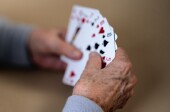Compulsive Gamblers Don't Learn From Their Mistakes
Study finds they have a mental rigidity that keeps them from folding their cards.
|
E-mail this article
Subscribe to news
Printer friendly version
|

(SOURCE: BioMed Central, news release, March 26, 2008)
THURSDAY, March 27 (HealthDay News) -- A form of mental rigidity that leads to compulsive behavior may explain why gambling addicts can't stop trying their luck even when they're on a losing streak, a new Italian study suggests.
It's not known what causes compulsive gambling, but it's been suggested that environmental factors and genetic predisposition play a role, affecting chemical signals in the brain, said researcher Donatella Marazziti and colleagues at the University of Pisa.
They conducted a series of neuropsychological tests on 15 male and five female pathological gamblers in an attempt to identify areas of the brain associated with the disorder. The results of the tests, which assessed problem-solving abilities, were compared to a group of healthy people.
The gamblers did well on all the tests except for the Wisconsin Card Sorting Test (WCST). In this test, the gamblers had great difficulty in finding different ways to solve each problem in the test, while the healthy participants got better with practice.
"Our findings show that in spite of normal intellectual, linguistic and visual-spatial abilities, the pathological gamblers could not learn from their mistakes to look for alternative solutions in the WCST," the study authors wrote.
This suggests that compulsive gamblers have differences in an area of the brain called the prefrontal region, which is involved in problem-solving.
"These differences might provoke a sort of cognitive 'rigidity' that predisposes a person to the development of impulsive or compulsive behavior, leading to pathological gambling," the researchers concluded.
The study was published in the March 26 issue of Clinical Practice and Epidemiology in Mental Health.
More information
The American Academy of Family Physicians has more about problem gambling. 
Copyright © 2008 ScoutNews, LLC. All rights reserved. 
HealthDayNews articles are derived from various sources and do not reflect federal policy. healthfinder.gov does not endorse opinions, products, or services that may appear in news stories. For more information on health topics in the news, visit the healthfinder.gov health library.